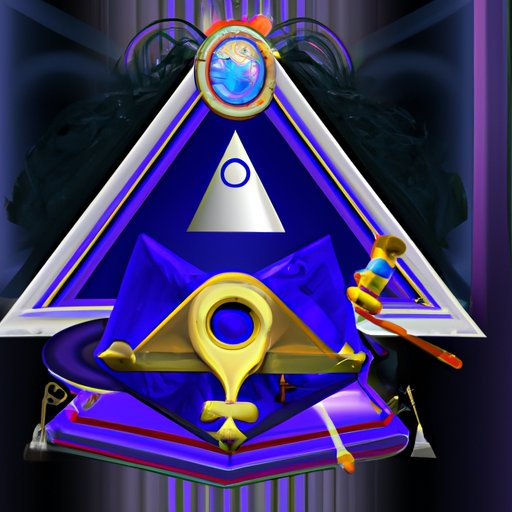Introduction
Freemasonry is an ancient fraternal organization that has been around for centuries. It is believed to have originated in the late 1600s in London, England, when four lodges came together to form the first Grand Lodge. Since then, Freemasonry has grown into a global brotherhood with millions of members worldwide. Its purpose is to bring men from different backgrounds together by teaching them moral values, encouraging good citizenship, and providing social activities for its members.
The purpose of this article is to provide information about Freemasonry and explain how to become a Freemason. We will discuss the research necessary to understand Freemasonry, how to join a Masonic Lodge, participating in events and activities, building relationships with other Masons, learning Masonic Law and Order, and exploring Freemasonry in today’s society.
Researching Freemasonry
Before joining Freemasonry, it is important to understand its history and philosophy. The basic tenets of Freemasonry are based on moral principles such as brotherly love, relief, and truth. There are also many rituals and symbols associated with Freemasonry, which have been passed down through generations. These rituals and symbols are meant to teach lessons about morality, ethics, and justice.
In addition to researching the history and philosophy of Freemasonry, it is also important to understand the rituals and symbols associated with the organization. Many of these rituals and symbols are closely guarded secrets, but some are available to the public. For example, the Square and Compasses, which is one of the most recognizable symbols of Freemasonry, is a representation of ethics and morality.
Joining a Lodge
Once you have done your research and feel comfortable joining Freemasonry, the next step is to locate a Masonic Lodge. Most major cities have at least one Masonic Lodge, and they can usually be found listed in local directories or online. It is important to note that not all lodges are open to the public, so it is best to contact a lodge prior to visiting.
Once you have located a Masonic Lodge, the next step is to attend meetings and get to know the members. This is a great way to learn more about Freemasonry and make connections with like-minded individuals. Most lodges hold regular meetings and events, so it is important to stay informed about upcoming activities.
Participating in Events and Activities
In addition to attending meetings, there are many other ways to participate in Freemasonry. One of the most popular activities is attending Masonic events such as dinners, dances, and other social functions. These events are a great way to meet other Masons and build relationships.
Another way to get involved in Freemasonry is to participate in charitable works. Many lodges organize fundraisers and volunteer opportunities to benefit their communities. Examples of these activities include blood drives, food pantries, and educational programs. Participating in these events is a great way to give back to your community and show your commitment to Freemasonry.
Developing Relationships
One of the key aspects of Freemasonry is developing relationships with other Masons. This includes networking with other members, as well as establishing friendships. Networking can help you find mentorship opportunities and gain access to resources that may not be available to the general public. Establishing friendships with other Masons helps create a sense of unity within the organization and strengthens the bonds of brotherhood.

Learning Masonic Law and Order
In order to become a true Mason, it is important to understand the principles of Masonic law. According to the United Grand Lodge of England, “Masonic law is based upon the Ancient Landmarks, the Constitutions and Regulations of the United Grand Lodge of England, and the Bye-Laws of individual Lodges.” In addition to understanding the laws, it is important to understand the obligations of Masonic members. This includes being honest and upright in all dealings, treating others with respect, and upholding the principles of Freemasonry.
Exploring Freemasonry in Today’s Society
Freemasonry is still relevant and active in today’s society. The organization is known for its charitable works, such as supporting hospitals, orphanages, and schools. Freemasonry also plays an important role in promoting cultural awareness and understanding. By bringing people together and fostering respect and understanding between cultures, Freemasonry can help bridge the gap and promote peace.
Conclusion
Becoming a Freemason is a rewarding experience that can provide numerous personal and professional benefits. Through research and participation in events and activities, members can gain a better understanding of Freemasonry, its history, and its current role in society. By forming relationships with other Masons and learning Masonic law and order, members can gain a deeper appreciation for the organization and its principles.
By taking the time to learn about Freemasonry and its history, members can become active participants in the organization and reap the benefits of being part of a global brotherhood. Freemasonry is an ancient tradition that continues to thrive in today’s society, and its members continue to strive for the betterment of mankind.
(Note: Is this article not meeting your expectations? Do you have knowledge or insights to share? Unlock new opportunities and expand your reach by joining our authors team. Click Registration to join us and share your expertise with our readers.)
